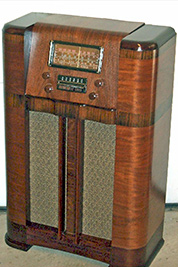PRAYER WAS THE FIRST WIRELESS COMMUNICATIONI
La Oración Era el Método Primero de Comunicación
Posted Monday, February 28, 2022
by
Mary Hunt Webb
Posted Monday, February 28, 2022

In the early 20th century and up into the 1960s, people in what is now known as the United Kingdom referred to a radio as the "wireless". [Photographer: Libos Houska. Photo courtesy of Pixabay.com.]
When I read books that were written in England from the early 20th century up into the 1960s, I notice that the term "wireless" refers to the apparatus that captured radio signals. In that era, the device relied on an electrical cord and plug to connect it to a wall outlet in order operate it. It took me some time to understand that it was the same device that Americans know as a "radio". Radios now typically have two bands, AM and FM. However, one of our cars has AM, FM1 and FM2. Radios with nine bands may be known as "shortwave" or "world radio".

Early in our marriage, my husband and I owned a floor model radio similar to this one by which we were able to receive radio stations from other countries. [Photographer: Lyndell Scott. Photo courtesy of Radio Attic Archives.]
In the late 1900s, the term "wireless radio" gained a different meaning when it was used to refer to radio sets and other devices that use batteries so that they are, indeed, wireless or without cords.
For Christians, communication without wires is not new. We are connected to God, Jesus, and the Holy Spirit through prayer that does not require electricity or batteries. Unlike radio, which requires programming and scripting, prayer is spontaneous and heartfelt. We don't have to worry about what to say because the Apostle Paul advised in Romans 8:26-27 that, " 26) … the Spirit helps us in our weakness. We do not know what we ought to pray for, but the Spirit himself intercedes for us with groans that words cannot express. 27) And the Father who knows all hearts knows what the spirit is saying, for the spirit pleads for us believers in harmony with God's own will." (NIV)
Part of praying is learning to listen. I spent several years asking God to speak to me. Maybe He already was doing that but I didn't recognize that He was. I may have thought that some of the ideas were my own thoughts when they were actually from Him. It was in 2003 when I realized that He was speaking to my heart and saying things to me that I could not have known or imagined otherwise. They were definitely not my thoughts! That's how I knew it was God speaking to me.
When people hear me say that God speaks to me, they frequently reply, "I wish God would speak to me!"
My response is, "When He does speak to you, you must do what He says! If you don't, He may not speak to you again."
Obedience is the difficult part because people often don't want to do what He says, especially when it doesn't make sense to them.

When Jonah didn't obey God's command to go to Nineveh, God sent a large fish to transport Jonah and deliver him to shore. [Artist: Pieter Lastman. Artwork courtesy of fineartamerca.com.]
That was the case with Jonah, as you can see in Jonah 1:1-17 in the Bible. It's a fascinating story of how God maneuvered Jonah into obedience by having him spend three days inside a very large fish. (The Bible uses the term "big fish" rather than a "whale".) If you truly want God to speak to you and you don't want Him to give you the silent treatment or maneuver you into obedience, then you need to be sincere when you ask Him to speak to you. You will be amazed at what He will do when you obey Him.
BIBLE VERSES USED IN THIS POSTING
Romans 8:26-27 — 26) … the Spirit helps us in our weakness. We do not know what we ought to pray for, but the Spirit himself intercedes for us with groans that words cannot express. 27) And the Father who knows all hearts knows what the spirit is saying, for the spirit pleads for us believers in harmony with God's own will. (NIV)
Romanos 8:26-27 — 26) … el Espíritu nos ayuda en nuestra debilidad; pues qué hemos de pedir como conviene, no lo sabemos, pero el Espíritu mismo intercede por nosotros con gemidos indecibles.27) Mas el que escudriña los corazones sabe cuál es la intención del Espíritu, porque conforme a la voluntad de Dios intercede por los santos. (Reina-Valera 1960)
